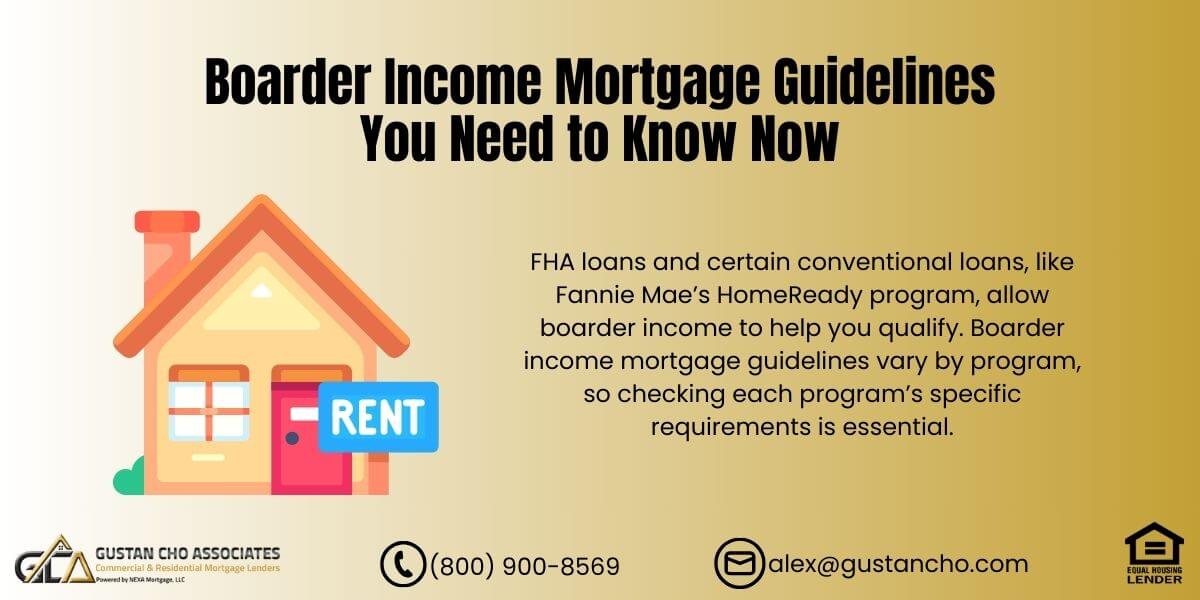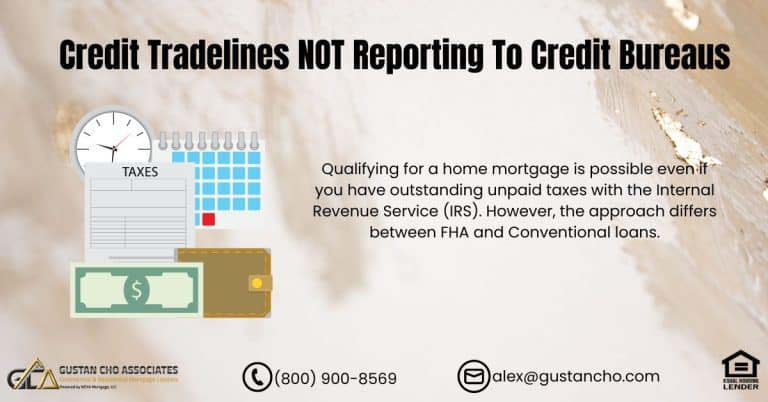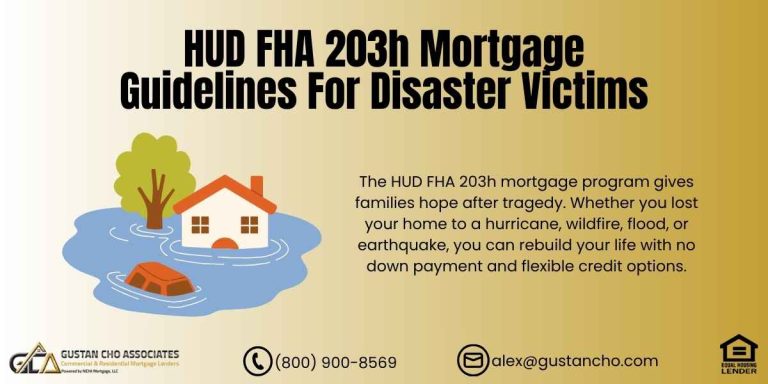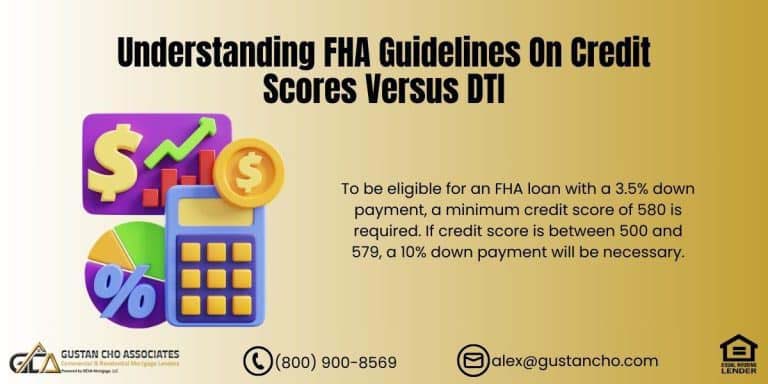Boarder Income Mortgage Guidelines for 2024: Boosting Your Income to Buy or Refinance a Home
Are you wondering if the rent you collect from a roommate or boarder could help you qualify for a mortgage? With rising home prices, every bit of income can make a big difference. Let’s dive into how boarder income works with FHA, VA, and conventional loans, along with practical tips to qualify for a loan using boarder income.
Can Boarder Income Help You Qualify for a Mortgage?
Boarder income is the rental income from someone living in your home, whether it’s a friend, family member, or tenant. With more people turning to shared living to manage high housing costs, using this additional income to qualify for a mortgage has become a common question.
Many lenders allow boarder income, but there are specific guidelines. This article will cover how FHA, Fannie Mae, and VA loans treat boarder income, the documentation needed, and the latest updates for 2024 to make sure you’re prepared.
FHA Boarder Income Mortgage Guidelines
The FHA allows you to use boarder income toward qualifying for a mortgage under certain conditions. Here’s what you need to know:
FHA Guidelines: Can You Count Boarder Income?
The FHA, overseen by HUD (U.S. Department of Housing and Urban Development), allows borrowers to count boarder income if they can show a two-year history of boarder income on their tax returns. However, the FHA has some rules you must meet:
- Two-Year Income History: To count boarder income, you must show two years of tax returns, including this income. This shows lenders that the boarder income is consistent and reliable.
- Current Income Requirement: You must currently be receiving this boarder income. If you stopped receiving income or your tenant moved out, that income can’t be used to qualify.
Want to Use Boarder Income to Qualify for Your Mortgage? Let Us Help!
Contact us today to learn how you can use boarder income to get approved for your home loan.
Required Documentation for FHA Loans Using Boarder Income
To use boarder income, you’ll need to document it thoroughly. Here’s what FHA lenders will look for:
- Two Years of Tax Returns: Your tax returns should clearly show the boarder income you’ve received in the past two years.
- Current Lease Agreement: You’ll need a lease agreement outlining the terms of the boarder’s stay, such as monthly rent and length of occupancy.
If you’re purchasing a new home and plan to bring in a boarder, you’ll need an executed lease agreement showing your intention to continue renting out space in the new home.
How Much Boarder Income Counts for Debt-to-Income Ratio?
The FHA’s boarder income guidelines allow the lender to count the lesser of:
- The two-year average of boarder income as shown on tax returns or
- The monthly amount is listed on the current lease agreement.
Lenders will use the smaller of these two figures to calculate your debt-to-income (DTI) ratio.
Conventional Loans: Fannie Mae and Freddie Mac Boarder Income Guidelines
For most conventional loans, boarder income typically doesn’t qualify as stable income, so it doesn’t count toward your DTI ratio. However, there are specific exceptions for borrowers with disabilities who receive rental income from live-in personal assistants.
Special Exception for Borrowers with Disabilities
If you have a disability and a live-in personal assistant, your rental payments may be counted as boarder income in limited cases. Here’s how it works:
- Up to 30% of Gross Income: You may count up to 30% of the rental income from a personal assistant toward your gross income if they live with you and their rental payments are made directly to you.
- Medicaid Waiver Funds: In some cases, Medicaid Waiver funds help cover personal assistant expenses, including room and board, which can be factored in as part of your qualifying income.
This exception can significantly benefit disabled borrowers by helping increase qualifying income and, in turn, the loan amount.
Fannie Mae’s HomeReady Program: How Boarder Income Counts
If you’re applying for a HomeReady loan through Fannie Mae, boarder income can be a valuable asset. HomeReady is a unique conventional loan program that allows you to use boarder income under specific conditions:
- One-Unit Property Requirement: Boarder income is allowed for HomeReady loans on single-unit properties.
- 30% Cap on Boarder Income: You can use boarder income for up to 30% of the qualifying income, making it easier to meet DTI requirements.
- 12-Month Residency History: You must prove that the boarder has lived with you for at least 12 months and has been making regular payments.
To verify this, lenders will ask for documentation like:
- Driver’s License or Utility Bills: The boarder’s driver’s license, bank statement, or bill should match your address, proving they live with you.
- Proof of Payment: The boarder should pay rent directly to you, and you must show a record of their payments for at least 12 months. If you can only provide proof for nine of the last 12 months, the lender will average those payments over 12 months.
VA Loans and Boarder Income in 2024
VA loans offer incredible benefits for qualified veterans, but boarder income is not eligible. Even if you can document consistent income from a boarder, the VA doesn’t currently count it toward your DTI ratio.
Will the VA Change Their Boarder Income Policy?
In recent years, the VA has hinted that it might reconsider boarder income guidelines. Many veterans would benefit from being able to count income from roommates or boarders, especially in high-cost areas. As of 2024, there’s no official policy change, but keep an eye out for updates as the VA continues to adapt to housing needs.
Step-By-Step Guide: Qualifying for a Mortgage with Boarder Income

Step 1: Determine Your Eligibility
- FHA Loan: You need a two-year history of boarder income on your tax returns and a current lease agreement.
- Conventional Loan (HomeReady): Accepts boarder income for up to 30% of your qualifying income if you meet the documentation requirements.
- VA Loan: Does not currently accept boarder income.
Step 2: Gather Documentation
Collect these documents to streamline the process:
- Tax Returns: Showing two years of boarder income if you apply for an FHA loan.
- Lease Agreement: A signed lease with your boarder indicating monthly rent.
- Proof of Address and Payment History: For HomeReady, documents proving that the boarder has lived with you and paid rent for at least 12 months.
Step 3: Talk to Your Lender
Discuss your options with a lender who understands boarder income mortgage guidelines. Experienced lenders can guide you through specific FHA, conventional, or VA loan requirements and help you maximize your qualifying income.
Need Extra Income for Your Mortgage? Use Boarder Income to Qualify!
Contact us today to learn how we can help you use boarder income to qualify for your home loan.
Real-Life Scenarios: How Boarder Income Can Help You Qualify
Let’s look at some scenarios to help you understand how boarder income might work in real life.
Scenario 1: FHA Loan with Boarder Income
Emma wants to buy a new home using an FHA loan and has been renting a room to her friend for three years. She earns $40,000 annually and receives $600 monthly from her boarder, totaling $7,200 annually.
Since Emma’s boarder income appears on her tax returns for the past two years and she has a current lease with her friend, she can use the lesser of the two-year average ($7,200) or the lease amount ($7,200) toward her DTI. The additional income helps lower her DTI ratio, which could boost her purchasing power.
Scenario 2: HomeReady Loan with Boarder Income
James is applying for a HomeReady loan. He makes $50,000 annually and rents a room to his cousin, who has paid $400 monthly for the past year.
For HomeReady, James can use up to 30% of his boarder income. Since his cousin has paid consistently, and James has proof of residency, the additional $400 per month can count toward his income, improving his chances of loan approval.
Scenario 3: VA Loan with Roommate Income
A retired Marine, Lisa receives $1,000 monthly from renting out her basement. She applied for a VA loan but learned that the VA does not allow boarder income.
Even though Lisa can’t use her boarder income, she has decided to explore alternative loan options, such as FHA or HomeReady, to benefit from her rental income. Talking to her lender about these options opens the door to other lending possibilities.
Pros and Cons of Using Boarder Income for Mortgage Qualification
Comprehending the advantages and possible difficulties of utilizing additional income is crucial before moving forward.
Pros
- Increases Your Loan Amount: Including boarder income in your calculations can help you qualify for a bigger loan by reducing your DTI ratio.
- Makes High-Cost Areas More Accessible: Additional boarder income might make buying a home more realistic in areas with higher home prices.
- Adds Financial Flexibility: If you’re considering refinancing, boarder income may improve your DTI, potentially qualifying you for better rates.
Cons
- Strict Documentation Requirements: Boarder income requires significant documentation, like lease agreements and tax returns.
- Limited Loan Program Options: Only FHA and certain conventional programs like HomeReady allow boarder income, limiting your choices.
- VA Loans Exclude Boarder Income: If you’re a veteran, the VA’s exclusion of boarder income means you may need to explore FHA or HomeReady as alternatives.
Practical Tips for Maximizing Boarder Income in 2024
- Keep Documentation Organized: Consistently document your rental income and ensure all lease agreements are up-to-date and filed.
- Set up Direct Payments: Recording direct payments (like bank transfers) helps verify income, which is crucial for lenders.
- Consider HomeReady for Multi-Generational Households: HomeReady’s flexibility with boarder income might be a good fit if you share your home with family members.
Final Thoughts: Is Using Boarder Income Right for You?
Using boarder income to qualify for a mortgage is a smart move, especially if you’re in a high-cost area or need the extra income to meet loan requirements. If you meet the FHA or HomeReady program’s guidelines, it’s worth exploring these options with your lender. And while the VA currently doesn’t allow boarder income, they may introduce changes in the future, so keep an eye out.
If you have any questions or need guidance, contact an experienced mortgage advisor who understands the nuances of boarder income mortgage guidelines like Gustan Cho Associates. With the right lender and a strategic plan, you’ll be well on your way to maximizing your income and achieving your homeownership goals.
Let’s get started today! Call or text us at 800-900-8569 or email alex@gustancho.com. We are available 7 days a week, even on holidays.
Frequently Asked Questions About Boarder Income Mortgage Guidelines:
Q: What are Boarder Income Mortgage Guidelines?
A: Boarder income mortgage guidelines help determine how rental income from a roommate or boarder can be used when applying for a mortgage. These guidelines outline what loan programs accept boarder income and the documentation you need to qualify.
Q: Can I Use Boarder Income to Qualify for a Mortgage?
A: Some loan programs, like FHA and Fannie Mae’s HomeReady, allow you to use boarder income. However, you’ll need to follow specific boarder income mortgage guidelines, including providing proof of steady rental income over a set period.
Q: Which Loan Types Allow Boarder Income for Qualification?
A: FHA loans and certain conventional loans, like Fannie Mae’s HomeReady program, allow boarder income to help you qualify. Boarder income mortgage guidelines vary by program, so checking each program’s specific requirements is essential.
Q: How Can FHA Loans Use Boarder Income?
A: Under FHA boarder income mortgage guidelines, you must show a two-year history of receiving boarder income on your tax returns and a current lease. FHA will count the lesser amount between the two-year average income or the current lease.
Q: Can I Count Boarder Income for VA Loans?
A: VA loans do not allow boarder income to qualify for a mortgage. The VA does not include rental income from a roommate or boarder, even if it appears on your tax returns or lease.
Q: What Documentation do I Need to Use Boarder Income on a HomeReady Loan?
A: HomeReady requires you to show that the boarder has lived with you for at least 12 months and paid rent regularly. This means you’ll need a lease, proof of residency, and records of rental payments as part of boarder income mortgage guidelines.
Q: How Much of My Boarder Income Can I Use for a HomeReady Loan?
A: With HomeReady, you can use up to 30% of your total qualifying income from boarder income. However, you must meet all boarder income mortgage guidelines by providing adequate documentation for the lender.
Q: Can I Count Boarder Income if I’m Buying a New Home?
A: Yes, but only if you provide a signed lease showing your intention to continue renting out space in the new home. FHA’s boarder income mortgage guidelines require this to ensure the rental income is ongoing and consistent.
Q: Do All Lenders Accept Boarder Income?
A: No, acceptance of boarder income depends on the loan type and lender policies. FHA and some conventional loans like HomeReady may accept it, but others, like VA loans, do not. Make sure to check with your lender about their specific boarder income mortgage guidelines.
Q: Why is Boarder Income Helpful for Mortgage Qualification?
A: Boarder income can increase your total qualifying income, helping you to meet debt-to-income (DTI) requirements and potentially qualify for a larger loan. By following boarder income mortgage guidelines, you can increase your chances of getting approved for a mortgage, especially in high-cost areas.
This blog about “Boarder Income Mortgage Guidelines You Need to Know Now” was updated on October 30th, 2024.
Want to Qualify for a Mortgage with Boarder Income? We Can Help!
Contact us now to see how we can help you use boarder income for your home loan.








